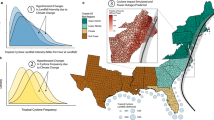Abstract
Accurate estimates of the duration of power outages caused by hurricanes prior to landfall are valuable for utility companies and government agencies that wish to plan and optimize their restoration efforts. Accurate pre-storm estimates are also important information for customers and operators of other infrastructures systems, who rely heavily on electricity. Traditionally, utilities make restoration plans based on managerial judgment and experience. However, skillful outage forecast models are conducive to improved decision-making practices by utilities and can greatly enhance storm preparation and restoration management procedures of power companies and emergency managers. This paper presents a novel statistical approach for estimating power outage durations that is 87 % more accurate than existing models in the literature. The power outage duration models are developed and carefully validated for outages caused by Hurricanes Dennis, Katrina, and Ivan in a central Gulf Coast state. This paper identifies the key variables in predicting hurricane-induced outage durations and their degree of influence on predicting outage restoration for the utility company service area used as our case study.















Similar content being viewed by others
References
Breiman L (2001) Random forests. Mach Learn 45:5–32
Brown RE, Gupta S, Christie RD, Venkata SS, Fletcher R (1997) Distribution system reliability assessment: momentary interruptions and storms. IEEE Trans Power Deliv 12(4):1569–1575
Cutler DR, Edwards TC Jr, Beard KH, Cutler A, Hess KT, Gibson J, Lawler JJ (2007) Random forests for classification in ecology. Ecology 88(11):2783–2792
Davidson RA, Liu H, Sarpong IK, Sparks P, Rosowsky DV (2003) Electric power distribution system performance in Carolina hurricanes. Nat Hazards Rev 4(1):36–45
De’Ath G (2007) Boosted trees for ecological modeling and prediction. Ecology 88(1):243–251
Friedman JH (2001) Greedy function approximation: a gradient boosting machine. Ann Stat 29(5):1189–1232
Guikema SD (2009) Natural disaster risk analysis for critical infrastructure systems: an approach based on statistical learning theory. Reliab Eng Syst Saf 94(4):855–860
Guikema SD, Quiring SM, Han SR (2010) Pre-storm estimation of hurricane damage to electric power distribution systems. Risk Anal 30(12):1744–1752
Han SR, Guikema SD, Quiring SM, Lee K, Rosowsky D, Davidson RA (2009a) Estimating the spatial distribution of power outages during hurricanes in the Gulf coast region. Reliab Eng Syst Saf 94(2):199–210
Han SR, Guikema SD, Quiring SM (2009b) Improving the predictive accuracy of hurricane power outage forecasts using generalized additive models. Risk Anal 29(10):1443–1453
Hastie T, Tibshirani R, Friedman J (2011) The elements of statistical learning; data mining, inference and prediction, 2nd edn. Springer, New York
Impact Weather: www.impactweather.com. Last accessed 28 June 2010 at 12:00 pm
Joshi NN, Lambert JH (2011) Diversification of engineering infrastructure investments for emergent and unknown non-systematic risks. J Risk Res 14(4):1466–4461
Lambert JH, Tsang J, Thekdi S (2013) Risk-informed investment for tropical cyclone preparedness of highway signs, signals, and lights. ASCE J Infrastruct Syst 19(4):384–394
Lubkeman D, Julian DE (2004) Large scale storm outage management. IEEE Power Eng Soc Gen Meet 1:16–22
Liu H, Davidson RA, Apanasovich TV (2007) Statistical forecasting of electric power restoration times in hurricanes and ice storms. IEEE Trans Power Syst 22(4):2270–2279
Nateghi R (2012) Modeling hurricane activity in the Atlantic Basin and reliability of power distribution systems impacted by hurricanes in the U.S. Ph.D. thesis, Johns Hopkins University, Department of Geography and Environmental Engineering, 2012
Nateghi R, Guikema SD, Quiring SM (2013) Comparison and validation of statistical methods for predicting power outage durations in the event of hurricane. Risk Anal 31(12):1897–1906
NLCD (2001) http://www.epa.gov/mrlc/nlcd-2001.html. Last accessed in 29 Jan 2010
Quiring SM, Zhu L, Guikema S (2011) Importance of soil and elevation characteristics for modeling power system outages due to hurricanes. Nat Hazards 58:365–390. doi:10.1007/s11069-010-9672-9
Reed DA (2008) Electric utility distribution analysis for extreme winds. J Wind Eng Ind Aerodyn 96(1):123–140
Reed DA, Nojima N, Park J (2003) Performance assessment of lifelines. 16th ASCE Engineering Mechanics Conference, 16–18 July, Washington, Seattle
Shortridge JE, Guikema SD (2014) Public health and pipe breaks in water distribution systems: analysis with internet search volume as a proxy. Water Res 53:26–34
Thomas I (1996) Spatial data aggregation: exploratory analysis of road accidents. J Accid Anal Prev 28(2):251–264
Yule E, Kendall M (1950) An introduction to the theory of statistics, 14th edn. Charles Griffin, London
Zhu D, Cheng D, Broadwater RP, Scirbona C (2007) Storm modeling for prediction of power distribution system outages. J Electr Power Syst Res 77(8):973–979
Acknowledgments
We gratefully acknowledge the funding sources for this work from the National Science Foundation (CMMI 0968711 and 1149460 and SEES 1215872) and the U.S. Department of Energy (BER-FG02-08ER64644). However, all opinions in this paper are those of the authors and do not necessarily reflect the views of the sponsors.
Author information
Authors and Affiliations
Corresponding author
Rights and permissions
About this article
Cite this article
Nateghi, R., Guikema, S.D. & Quiring, S.M. Forecasting hurricane-induced power outage durations. Nat Hazards 74, 1795–1811 (2014). https://doi.org/10.1007/s11069-014-1270-9
Received:
Accepted:
Published:
Issue Date:
DOI: https://doi.org/10.1007/s11069-014-1270-9




